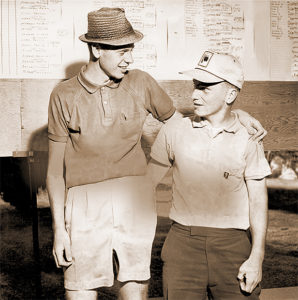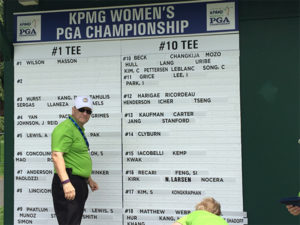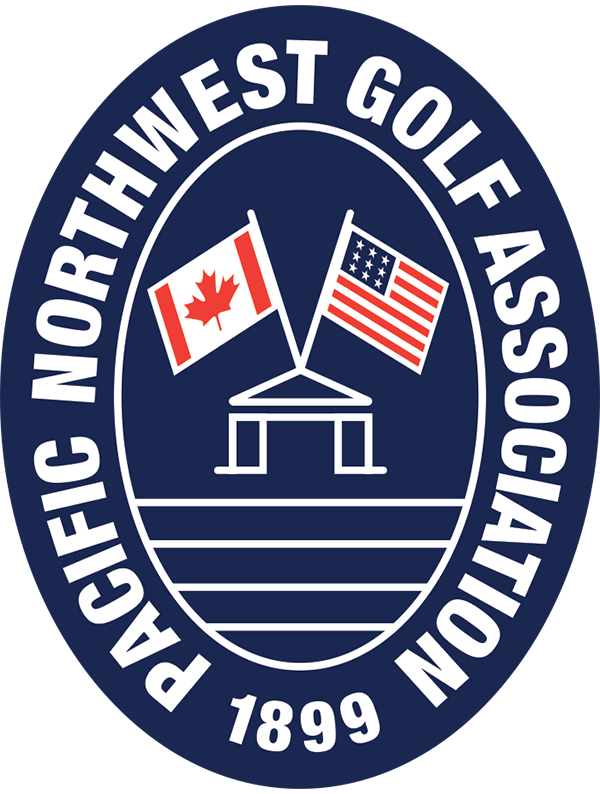Touching Them All: Ron Hagen’s lifelong affair with the game reached every corner of the Northwest’s golf community
by Bart Potter
A life in golf, spreading as widely and lasting as long as Ron Hagen’s, has meant knowing who to know, and why, by when, and how to do something when it needs doing. It has meant retirement interrupted, and not just once.
It has meant he never turned down a role – player and teacher, manager and mentor, business partner and enduring friend.
He’s the guy they call The Little General.

“You know his nickname,” says John Bodenhamer, the former executive director of the Pacific Northwest Golf Association. “But once you get to know Ron Hagen, you know he’ll give you the shirt off his back, especially with kids.”
Hagen’s resume, which the PGA apprentice program could adopt as its textbook, documents the length and breadth of his reach in Northwest golf.
He’s held PGA professional jobs at Yakima Country Club (his first job, beginning in 1967), Sand Point Country Club in Seattle, Sumner Meadows, Dungeness in Sequim, and The Home Course in DuPont, Wash. He coached golf for seven seasons (1977-83) at the University of Washington, where he recruited Bodenhamer, then a recent champion of the PNGA Junior Amateur, to play for the Huskies.
Hagen and his buddy Ron Coleman operated a golf-management company in Washington and Oregon.
He was named Professional of the Year by the Pacific Northwest Section PGA a record four times – in 1986, 1988, 1989 and 1990. In 2003, the name Ronnie G. Hagen was added to the rolls of the Section’s Hall of Fame.
He lives now, at 71, in retirement that he thinks might actually stick, in Goodyear, Ariz., with his wife Lola. He plays most of his golf at the 45 holes of the Tuscany Falls and Eagle’s Nest courses at his home Pebble Creek residential complex.
Golf has taken him down the road.
“I just thought it would be a fun opportunity, to help others learn the game as I learned the game,” he says today.
“It turned out to be true. I’ve been in the business for 50 years now, and I never got up not wanting to go to work.”
It started, this life affair with golf, when 12-year-old Ron Hagen came to know Bob Tindall at Seattle’s Jackson Park Golf Course. He liked to hunt golf balls at the course, and would stop to watch players teeing off.
Tindall, the patriarch of a well-known Northwest golf family, was the head pro at Jackson Park. The few tips Tindall offered one day to the receptive Hagen turned into real lessons on following days, and soon Hagen was competing in junior tournaments. He played on the golf team at Ingraham High School, and in 1963, as a senior, he won the All-Metro League championship.
Hagen went to Seattle University on a golf scholarship, but lasted there only a year. He worked construction with his brother for a couple years, and got tired of that. One day he hit his mentor with a question: “I asked Mr. Tindall what he thought about me getting in the golf business.”
The answer he got back – that the only reason to go into golf was for the love of the game – was all he needed to hear to move forward. Hagen earned his PGA credentials and turned pro in 1967.
Bodenhamer knew Hagen to be a good and generous teacher of golf. “He was just about the fundamentals. He wouldn’t try to change somebody drastically, in any cookie-cutter way.”
Hagen was a teacher of Rick Fehr, a Seattle-based touring pro who won twice on the PGA Tour in his career.
“I always enjoyed (teaching) all players,” Hagen says. “It never centered on whether it was a good player or a poor player.”
At Sumner Meadows in the early 2000s, Hagen was bothered that junior golfers had no place to play at a reasonable price. He established a club for young players – $50 buy-in – that included range balls at half-off, pro shop discounts, weekly clinics and a $5 standby rate. Within a couple years, 225 juniors were in the club.
Hagen took his junior golf model with him to The Home Course, where he was the founding professional after working closely with Bodenhamer and the PNGA to get the course opened in June 2007.
The youngest player Hagen tutored in his career was four years old. The oldest was 82, just starting out in golf.

“Only once in my lifetime did I have somebody I suggested maybe they might try a different game,” he says. “One. Out of thousands.”
In 1961, at age 15, Hagen won his way into the 36-hole match-play final of the PNGA Junior Amateur, played that year at Yakima Country Club. His opponent was a guy named Ron Coleman.
It was Coleman, then 16, 6-foot-3 and lanky, against Hagen, standing in at 5-foot-7. Hagen was two-up after the first 18 holes, and won hole No. 1 on the second 18 before Coleman got hot. As Coleman tells it, Hagen was unnerved by the 70 or so Yakima CC members who formed a gallery for the afternoon round. Coleman, on the other hand, remembers loving the attention. Coleman won, 7 and 6.
The two met again later that summer in the Seattle City Juniors. “He has me three down with three to go,” Coleman recalls. “I beat him on the 19th hole.”
Coleman cheerfully points out it took 25 years for Hagen to get him back. The two men, long since close friends by this time, met in the third round of the Washington State PGA Match Play Championship, and Hagen won, 2 and 1.
Hagen and Coleman worked closely together in the Western Washington PGA Chapter and the Pacific Northwest Section PGA, Hagen as president for two terms in each organization, and Coleman as executive director of the Chapter and later the Section.
“Over all the years, our Section and the Chapter, it was a good old boys network, not professional,” Coleman says. “So Hagen, being a businessman, looking at the bottom line, said, ‘All this past stuff is bull, we’re gonna get on with running things the way they should be.”
At the end of Hagen’s second term as Section president, Coleman went to a surplus store and bought an Army shirt and officer’s cap. He presented them to The Little General at a ceremony in a room full of golf professionals, none of whom got a bigger kick out of it, Coleman says, than Hagen.
By 1993, Hagen was looking for a new challenge. He approached Coleman and said, “Why don’t we start a management company?”
The result was Golf Resources Inc. (GRI), which traded on the two Rons’ sprawling network of contacts in Northwest golf. At its peak, GRI managed Walter Hall and Legion Memorial in Everett, Glen Acres Country Club in Seattle, the two Hawks Prairie courses in Lacey, Wash. (then known as Meriwood and Vicwood), Myrtle Creek in Oregon, Sumner Meadows, Tri-Mountain in Ridgefield, Wash., and Snoqualmie Ridge, where they oversaw construction of the Jack Nicklaus course – Coleman enjoyed riding around in the back of a pickup with Nicklaus.
In golf, Coleman was the longer hitter. “I was probably straighter,” Hagen says.
In business, they made the partnership work, in their Mutt-and-Jeff way.
“We were putting food on the table,” Coleman says. “I was the one hustling and getting the jobs. He was the pencil-pusher, the money man.”
Says Bodenhamer: “Coleman was kind of the schmoozer and diplomat. Hagen would be the bookkeeper. Coleman would go out and make the promises, while Hagen would be the one that made sure they were taken care of and the bills were paid.”
Hagen says, “We have trust in each other.”
Hagen is known, universally, as good with dollars and cents. Coleman, laughing, says it this way: “He was tighter than bark on a tree.”
Increased competition from other golf-management companies in a thinned golf market hastened the end of GRI, Coleman says. He left first – Hagen bought him out and lasted about another year. Hagen retired in 2004 – for the first time – to his then-home in Sumner, Wash., with Lola.
It didn’t last. Hagen was needed. In 2006, Bodenhamer brought him in (on Coleman’s recommendation) to consult on a new course in DuPont, Wash., that the PNGA was looking at buying for its headquarters.
“He helped us put some things together – what we could expect for rounds, what green fees we could charge, dress code,” Bodenhamer says. “He knew everybody in the industry, how to find equipment, who to order from. He knew right where to go.”
Who better to oversee the opening of The Home Course? One problem: “I was retired,” Hagen says.
He agreed to help open the course, and stay on afterward for a year, maybe two. But he found, he says, that he’d missed the day-to-day contact with golfers and course staff. He ended up staying on at The Home Course seven years.
He retired again in 2014, and even that didn’t last. He came back on an interim basis when The Home Course was suddenly without a head pro and stayed through the hiring of the current pro shop staff.
Hagen is the definition of old school – longtime acquaintances joke about the Sansabelt slacks he wore long past the point they were “fashionable” – but his working style, his business sense and his loyalty resonate just as readily with a younger generation.

“Ron is the most detail-oriented guy I’ve ever met,” says Justin Gravatt, 33, the new PGA head professional at The Home Course. “He opened my eyes to things that otherwise wouldn’t have been on my radar. He has an unbelievable passion for what he does. Ron would work for free if you let him.”
It’s only right, he says. Few conversations with Hagen about golf and his own contributions to it can go for long without some variation of “giving back.”
Bodenhamer has heard him say it and seen him live it.
“Ron wasn’t a guy who ever craved the limelight,” he says. “He wanted to give back to the game – the PNGA, the Section. He’s one of those guys that felt strongly that you had to give back to the game.”
Life, like the connection of flat club-face to round, dimpled golf ball, is never perfect. It’s more difficult for Ron Coleman, these days, than when he was winning golf tournaments and making promises for Hagen to keep.
He lives in Buckeye, Ariz., a short hop from Hagen. He has lingering heart issues after open-heart surgery a few years ago. He’s sorely grieving the loss of Carole, his wife of 51 years, who died from a heart attack just last October.
“They say time heals all wounds, but it hasn’t happened yet,” he says. “It’s still very tough on me.”
But he’s happy to talk, eager to help with any story about his friend Ron Hagen.
“He calls me Big Bro,” he says. “I call him Little Bro.”
The friends played nine holes not too long ago, and got together to hit practice balls another time.
“I’m trying to get him out more,” Hagen says of his pal.
It’s safe to say Big Bro’s got a golf date with Little Bro, if not this week, then further out, when he feels better.
That’s something, in a golf life, to look forward to.
Bart Potter has taught journalism at a public college and private university, and won awards for sportswriting and news reporting as a daily journalist. He manages the golf and travel website, greygoateegolf.com.






